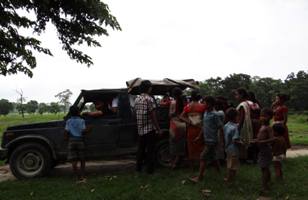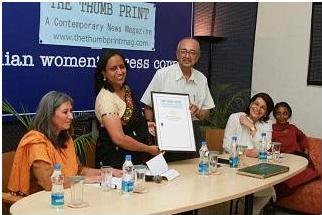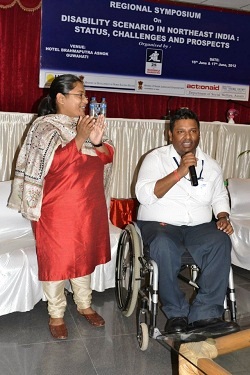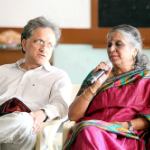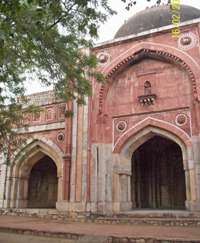Photo by Raphael Badache
Rise of temperature is inversely proportional to the availability of water in Delhi. As the summer hits its peak, more and more underprivileged people flog outside public water pumps in long queues to fill water. On the other hand a handful of people, rich and privileged take dips, jump, dive and enjoy rides in water parks. It is this contrast that characterises Delhi.
Delhi and surrounding area called National Capital Region has seven water parks. All of these water parks are on the periphery of the area. Officials confirm that each of them have 200-1500 visitors every day. These people include school children, middle class and upper middle class families and youngsters. Water used by each water park is upto to 100 million litres everyday. According to the website of Delhi’s planning department, the daily requirement of water of a person per day is calculated to be 274 litres. Thus, the amount of water used by a water park can fulfill the requirement of 3.5 hundred thousand people of Delhi everyday.
These figures raise crucial questions about the priorities of the government.
Jurassic Park Inn, a famous water park on GT Karnal Road gets about 1000 guests in a day.The entry fee for the park is Rs 750 per head excluding rental charge of swimming costume and cost of food inside. A back of the envelope calculation tells us that the cost for a family of four people’s outing for a day would range from between Rs 5,000 to Rs 6,000. The rates are similar in other parks like Splash Water Park and Just Chill Water Park. Official statistics suggest that an average person staying in New Delhi earns about Rs 16,750 per month. Thus, this kind of luxury is only limited to the rich and the mighty. The majority, who is poor struggles for even drinking water when there is a huge wastage of water at amusement parks, who extract ground water through bore wells for their consumption.
According to the latest directive of Delhi Jal Board, digging bore wells around Delhi is not permitted. If an industry owner wants to dig bore wells then proper permission is sought for the same. Some of these water parks claim that they use ground water but recharge it back into the ground using underwater harvesting tanks as per the guidelines issued by Delhi Jal Board. Deepak Malhotra, manager at Jurassic Park Inn explains, "Installation of these devices is their duty as water conservation is a issue of major concern." But not all the water parks recharge the water. A source from a 12 year old water park, Splash in Delhi said, "We have circulation tanks installed for purifying water that is used, so the water is reused but I am not very sure about underground water recharging process using water harvesting system." If he is to be believed then all the water used by them to for running the water park gets wasted. And only little would be recharged into ground. Further the ground water table, which is already low shall fall lower thereby raising question on the availability of water in the future.
Delhi doesn't receive all its supply from the Yamuna or any canal inside the city. Majority of the water that is received in the NCR is received from neighbouring states that is Haryana and Uttrakhand "Sources of water for major water supply throughout the city are beyond state boundaries. They include Bhakra Nangal Dam and Upper Ganga Canal. Only a small portion is received from the Yamuna River", said Rumi Aijaz. He is a scholar working on a project on water supply in Delhi from Research Foundation, a research organization in ITO Delhi. He works towards aiding in economic policy decisions. He adds," Many scholars have declared that Yamuna's water is soon going to be totally unfit for drinking. In such a scenario, since water is a state subject, the issue of the water supply to Delhi might have political ramifications later as the government in all the neighbouring states are not always cordial with Delhi government".
People who visit these water parks, however are unperturbed by this, visitors say that for them water parks are just a source of delight in the scorching heat of Delhi. A media researcher by profession, Dhriti Dixit says, "I love visiting water parks and recently visited 'Wonders of the World' along with my friends. I enjoy water amusement rides a lot." Delightful as it is, wastage of water is not an issue at all for a few, a student of accessory designing, Surbhi Bedi thinks that water is of course not wasted, it is reused and in these soaring temperatures, water parks are a fine choice. She says, "I intend to try a new water park each summer."
On the other hand, villages near the water parks on GT Karnal Road use ground water as well. They are forced to violate the law against digging borewells to meet their daily needs. Owner of a small restaurant living in the area said, "Most of the houses have bore wells installed which fulfils the need of water in the area. We receive water Delhi Jal Board also. But since that is not enough, most houses in the area dig a bore well."
Golf clubs are the other source of water usage. Golf courses generally are spread across vast stretches of land and massive amounts of water is said to be used in watering the grass in the courses. They at times have ponds and other water bodies too as part of the golf course.
The Delhi Golf Club, a prominent golf club in the capital has a different story to tell. Known for hosting championships like Indian Open and Panasonic Open Champion, the club is sprawled out across 220 acres. Secretary of Delhi Golf Club (DGC), Wing Commander Arun K Singh said, "The average daily usage of water by DGC is about a 100 thousand litres." He later added, "Since water conservation is a very important subject for us just like the rest of the world, we use treated sewage water that flows into the Yamuna. This water is not worthy of any other use except for watering the grass on the golf course." The Golf club also doesn't have any water body in the golf course to do away with the water loss thus caused.
The Golf club, however, like many others is accessible to only a privileged few. The entrance fee for Delhi Golf Club, informs their website is Rs Six hundred thousand for an Indian business member, Rs Three hundred thousand for government officers and Rs.1.5 hundred thousand for dependants. Manmohan Sethi, an 80 year old Golf player and Panasonic Open Champion told, "The minimum waiting list for non government officials in DGC is 28 years and for government officials it is about 15 to 18 years." The entry fee for even a government official is equal to the income of an average resident of Delhi for one and half year as the average income of a person in Delhi is Rs 2.01 hundred thousand in one whole year. The deputy operation manager of the DGC, Sudarshan Singh informed," The club has around 5000 members, majority of who are senior citizens. The members usually are the elite people of Delhi, including former and current bureaucrats and other influential people."
Activists continue to fight a hard battle against this discrimination and favoritism for the rich.
"In such a state is there any requirement for organizations like water parks and golf courses that use ground water?", asks Devinder Sharma, a food and trade policy analyst. According to him, "Water used in a golf course is equal to the water used in 18 thousand houses in Delhi." This water, in his opinion, "could be very well used for agricultural lands."
If things will remain the same then Delhi might run out of ground water in two years that is by 2015, says ASSOCHAM that is Associated Chambers of Commerce and Industry, a forum for discussion of issues between business and government.
Find us on facebook: facebook.com/TheThumbPrintMag





